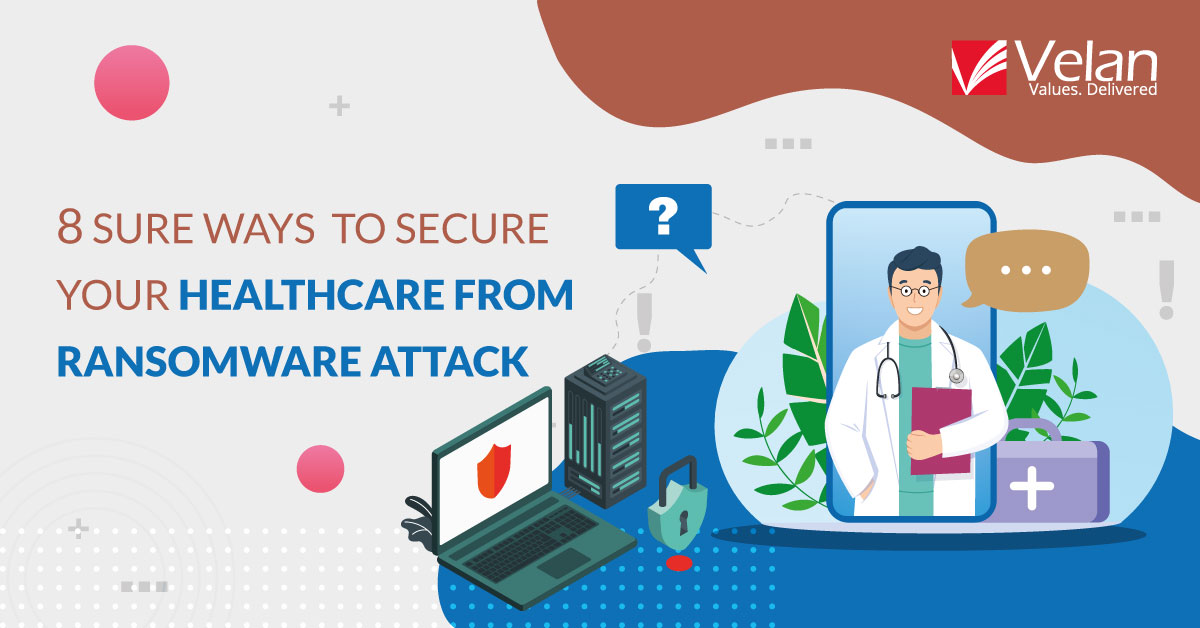8 Sure Ways To Secure Your Healthcare From Ransomware Attack 26 May 2021

It is appalling to think of the negative outcomes to the healthcare industry, should it be a victim of a grave hacking attack like ransomware. Unfortunately, ransomware attacks on the healthcare industry are not unusual, it happens often. In fact, a 2020 report by IBM labeled “Security: Cost of Data Breach,” highlighted that the healthcare industries have become prey to the enormous security breaches since six years.
And why is that?
It is because healthcare ransomware attacks fetch enormous money for criminals.
Hospitals hold the most sensitive data. And if that is vulnerable to hackers, then it would result in fatal aftermath, almost unrepairable.
Besides, the consequence of a security breach can be difficult for hospitals and patients as the provider’s reputation is at stake. And it would require the regulatory agents to step in. To dodge all the nuisance, guarantee protection, and shun ransomware possibilities, we have put together eight sure ways to secure your healthcare and build your security systems from a ransomware attack.
What is a ransomware attack?
A ransomware attack is a kind of cyberattack where important and valuable files are stolen and encrypted. The hacker will gain control of your computer and stop you from accessing your own files. This process is implicit, and you would not know about an attack until you access a file and a threatening note pops up on your computer screen. The attacker will blackmail you for money in exchange for the stolen data. Ideally, you are being held hostage in this situation. Nevertheless, there is no guarantee that you may get back all the stolen data even after the demands are met. Ransomware attacks are vicious and very costly. The attacks multiply quickly. After one device is damaged, all the connected devices to that network will also get damaged.
There are two types of hospital ransomware attacks—“locker” attacks and “crypto” attacks.
Locker attacks will prevent you from accessing your computer overall while crypto attacks mean enabling encryption on the stored data and files on your system and making them impossible to access. In some cases, you will be sent threatening pop-ups with every click of the mouse.
The ransomware attacks are vicious because your patient’s data is held, hostage. We recommend you secure your medical practice by following these steps.
How to protect your medical practice from ransomware attacks?
+ Educate your staff about phishing emails.
The main step to stop attackers is awareness. Ransomware attacks begin when an oblivious employee clicks on a seemingly valid link or file that contains malicious codes.
Some links can look legit, especially if they are sent from a trustworthy source. Nevertheless, attackers are shrewd and make corrupted links look similar to legitimate site links. The most common is just one letter variation, and it can redirect you to a different domain that then corrupts your computer. Educate your employees to validate the links even if there is a mild doubt. In the slightest of a suspicion, your employees can always rely on Google to validate it before clicking the link.
+ Adhere to complete IT Compliance.
It is vital to adhere to a complete IT security framework like HITRUST, NIST, or Critical Security Councils and maintain HIPAA compliance. It will help you identify any loopholes in your system and make sure that your systems are protected from breaches and cyber attacks.
In addition, a secured IT framework will guide you around risk management and help you formulate contingency plans should you need them.
+ Back up your data constantly.
We cannot stress enough on grave consequences of being a victim of ransomware attacks. Once you fall for it, restoring the data can be challenging. And for that reason, we insist that you need to consistently back up your data and store them in a cloud server. The data on the cloud server must hold limited access to safeguard it. Having multiple backups will prevent any cyber-attacks, make it easy to restore the data, and also secure against technical catastrophe.
Also, remember to test your backup regularly. You do not want to be in a notion that you have multiple backups just to discover that they are corrupted after the attack. While backing up your data, plan to test those backups.
+ Perform risk assessments regularly.
The latest inflation in COVID-related phishing emails is a salient reminder that cyber attacks are dynamic and evolving. The criminals keep their threats transient and adapt to the present conditions. So performing risk assessments is not a one-timer but an unceasing task.
Being oblivious to your vulnerabilities makes it susceptible to attackers. Without a clear understanding of your security loopholes, you are making an easy way for the attackers. And that is where assessing your risks regularly will help.
Your protection method must have clear security protocols. That way, even if an attacker contravenes one layer, they will not be able to move past it. And your IT security team will be immediately notified to stop the attacks before it gets too late.
In simple words, you must build multiple defense doors for your data and assess risks at least once a year (if not more).
+ Install uncompromising security.
Do not be complacent with your security systems when it comes to data. Prevention is better than cure, and it cannot be any fitting than the healthcare data. You must have anti-spam to arrest messages from suspicious and unauthorized sources. Doing so will prevent the attacks on your systems and curb its multiplication with the connected systems.
Fasten your security by enabling firewall protection and having anti-virus software on your server. Being proactive about your data’s security will remove any hindsight guilt.
+ Leverage AI and ML technology.
Systems that are controlled by artificial intelligence (AI) and machine learning (ML) are able to monitor real-time data and detect dubious emails. It will send you alarms or other indicators in the case of a well-planned ransomware attack. These technologies are excellent when it comes to data protection, data analysis, drug accounting, detecting insurance scams, and looking after other crucial tasks for the hospital.
+ Update your software promptly.
Never compromise on running regular software updates. Your IT team must be vigilant and plan the software updates when you can go easy on your patient’s data. Failing to update the software makes your entire data susceptible to attackers. You will want to associate with vendors that prioritize cybersecurity and be update the applications quickly when a threat has been suspected.
It starts with investing in the latest firewall software to secure your systems and data while utilizing the present anti-malware exposure. It is best to outsource cybersecurity maintenance.
+ Invest in cybersecurity insurance.
If you are thinking that insurance is an extra cost and you might not fall prey to the attackers, let us remind you that you are wrong and risking your reputation. The principal may look heavy on your pockets but the consequence will be heavier. Invest in insurance that provides blanket support to all the ransomware attacks. Doing so will prevent you from paying any amount to recover the stolen data, just in case.
Velan can help!
Don’t wait until the eleventh hour to protect your healthcare data. Cybersecurity is a high-priority matter, and failure to reinforce your resistance will lead to inevitable disaster. And with the world going topsy-turvy about the pandemic, we want you to focus on your strengths and leave the cyber threats worry to us as we are the experts.





